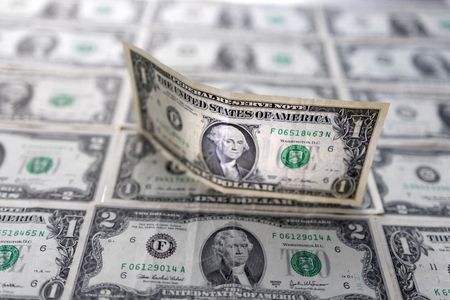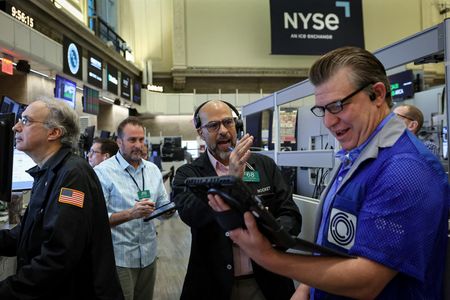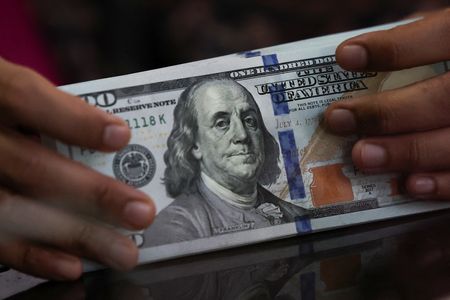By Stella Qiu
SYDNEY (Reuters) -Asian shares joined a global selloff on Friday as hawkish comments from Federal Reserve officials doused hopes for a U.S. rate cut next month, while a still messy data calendar added to the angst, hitting bonds, the dollar and even gold.
Japan’s Nikkei tumbled 1.8% on Friday, Australia’s resources-heavy shares slid 1.5%, while South Korea plunged 2.3%.
China will report its monthly activity figures later in the day, after weak lending data flagged concerns from households and businesses to take on more debt amid economic uncertainties.
Overnight, Wall Street tumbled with steep losses in Nvidia and other AI heavyweights on valuation concerns, while Treasuries retreated as investors scaled back expectations of a rate cut from the Fed in December to just 51%, down from 63% a day earlier.
The dollar failed to get a lift on higher yields, losing ground to the likes of the yen and Swiss franc.
“The drawdown seen across assets was pronounced, and looking across the suite of investible markets there were few places to hide,” said Chris Weston, head of research at Pepperstone.
“With the U.S. government open for business, traders now await the Bureau of Labor Statistics (BLS) schedule for key economic data… So far, positioning has been set largely on Tier 2 data, and that will need to be reconciled against the headline data that truly drives the Fed’s decision-making process.”
The White House, however, dashed hopes for a clearer view of the U.S. economy any time soon, saying that the U.S. unemployment rate for October may never be available. Adding to the downbeat mood and pointing to worries about high inflation, a growing number of Fed officials overnight signaled caution about further rate cuts.
Alberto Musalem, who runs the St. Louis Fed Bank, said there was limited room to ease further without becoming overly accommodative, while Cleveland Fed President Beth Hammack said interest rate policy should remain restrictive in order to put downward pressure on inflation.
Minneapolis Fed President Neel Kashkari told Bloomberg that he opposed a rate cut last month and is on the fence about December.
Treasuries fell overnight as investors pared back bets for a Fed cut next month. Two-year Treasury yields held at 3.597%, having risen 3 basis points overnight, while the 10-year yield rose 1 bp to 4.125%, after gaining 3 bps overnight.
The rise in yields, however, failed to support the U.S. dollar, which was down 0.2% against its major peers overnight and was at 99.254, close to the lowest level in two weeks.
The yen got some much-needed respite and last traded at 154.7 per dollar, just a touch above a nine-month low of 155.05 per dollar. The Swiss franc jumped 0.6% on the dollar.
Sterling, however, lost 0.3% to $1.3153 on Friday after the Financial Times reported Prime Minister Keir Starmer and finance minister Rachel Reeves have ditched their manifesto-busting plan to increase income tax rates.
Oil prices rose in early trade but were set for the third straight week of declines. U.S. West Texas Intermediate crude gained 0.4% to $58.91, but were down 1.4% this week.
Spot gold prices rose 0.3% to $4,183 per ounce, having lost 0.6% overnight to snap a four-day winning streak. It remained well off its record top of $4,381.
(Reporting by Stella QiuEding by Shri Navaratnam)










